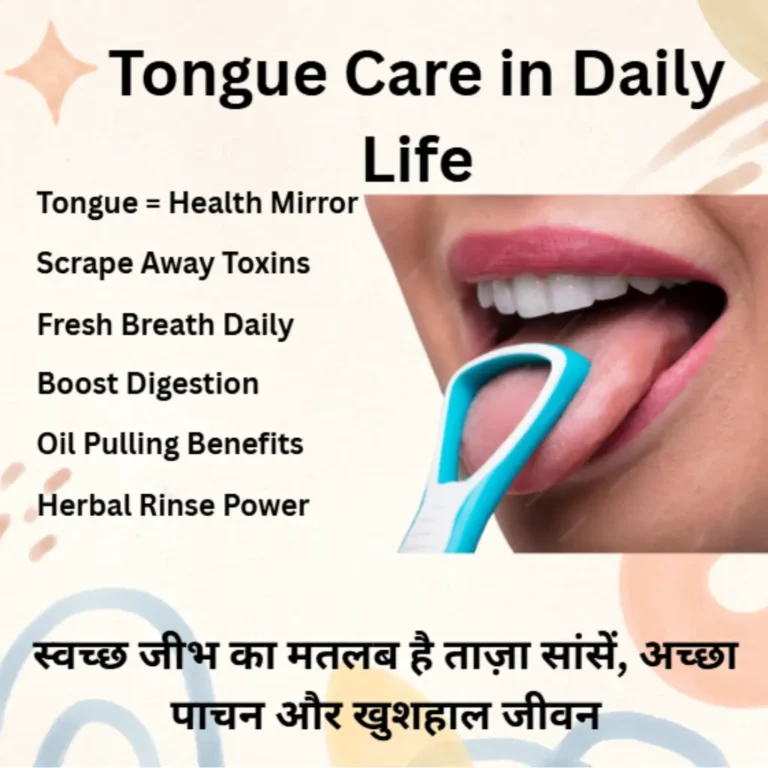Tongue Care in Daily Life – An Ayurvedic Guide
When you wake up in the morning and look into the mirror, have you ever noticed a white or yellow coating on your tongue? Most people ignore it, assuming it’s just a normal part of life. But in Ayurveda, your tongue is like a health report card. It not only reflects your oral hygiene but also reveals the state of your digestion, immunity, and overall well-being. That’s why tongue care in daily life is considered a vital step for maintaining good health.
Daily tongue care is not just about fresh breath—it’s about removing toxins, improving taste perception, aiding digestion, and even preventing diseases. Ayurveda emphasizes Jihva Pariksha (tongue examination) as a diagnostic tool and Jihva Nirlekhana (tongue scraping) as a vital daily practice in Dinacharya (daily routine).
In this article, we’ll explore why tongue care is so important, the Ayurvedic perspective on tongue health, practical remedies you can adopt daily, and how modern science supports these age-old practices.
Why Tongue Care Matters
The tongue is more than a muscle that helps us speak and taste. It plays three key roles in daily life:
-
Digestion begins on the tongue – Enzymes in saliva start breaking down food, and taste buds signal the body to release digestive juices.
-
Health mirror – Coating, color, or cracks on the tongue indicate imbalances in the body. For example, a thick white coating often means poor digestion or toxin buildup (Ama).
-
Oral hygiene – Without cleaning, bacteria accumulate on the tongue, leading to bad breath, tooth decay, and even systemic inflammation.
Real-life example: A young office worker struggling with persistent bad breath tried brushing and mouthwash with little success. Only after adopting daily tongue scraping and oil pulling did he notice lasting freshness and improved digestion.
Also Read: Ayurvedic Herbs for Indigestion
The Ayurvedic Perspective: Tongue & Doshas
In Ayurveda, the tongue is considered a powerful diagnostic tool. Physicians often ask patients to stick out their tongue before starting a consultation. Why? Because the tongue reflects the balance or imbalance of the three doshas:
-
Kapha imbalance → thick, whitish coating on the tongue.
-
Pitta imbalance → yellowish or reddish tongue, sometimes with ulcers.
-
Vata imbalance → dry, rough, or cracked tongue.
Ayurveda also links specific areas of the tongue with internal organs:
-
Front → lungs and heart.
-
Middle → stomach and pancreas.
-
Back → intestines and kidneys.
This mapping means your tongue can signal early warnings of deeper health issues.
Daily Tongue Care Practices in Ayurveda
Ayurveda recommends a holistic approach to tongue care as part of Dinacharya (daily routine). The focus is not just on cleaning the tongue but also on preventing toxin buildup (Ama), strengthening oral health, and supporting digestion. Let’s look at the most effective practices you can include in your daily life.
1. Tongue Scraping (Jihva Nirlekhana)
One of the oldest and most important Ayurvedic practices, tongue scraping involves gently removing the coating from the tongue every morning.
How to do it:
-
Use a scraper made of copper, silver, or stainless steel.
-
Hold both ends, place it at the back of your tongue, and gently pull forward.
-
Rinse the scraper and repeat 5–7 times.
-
Wash your mouth with lukewarm water afterward.
Benefits:
-
Removes bacteria and toxins (Ama).
-
Improves taste perception.
-
Prevents bad breath.
-
Stimulates digestive organs by activating taste buds.
Tip: Copper scrapers are often preferred in Ayurveda because copper has natural antimicrobial properties.
2. Oil Pulling (Gandusha / Kavala)
Oil pulling is another ancient practice that complements tongue care. It involves swishing oil in the mouth to pull out toxins.
How to do it:
-
Take 1 tablespoon of sesame oil or coconut oil.
-
Swish it around your mouth for 10–15 minutes (do not swallow).
-
Spit it out and rinse your mouth with warm water.
-
Brush your teeth as usual.
Benefits:
-
Reduces harmful oral bacteria.
-
Strengthens gums and teeth.
-
Moisturizes the mouth, preventing dryness.
-
Supports detoxification.
🩺 Modern science agrees: Studies show oil pulling significantly reduces Streptococcus mutans (a bacteria linked with tooth decay).
3. Herbal Mouth Rinses
Instead of chemical mouthwashes, Ayurveda suggests natural rinses prepared from herbs and spices.
-
Triphala decoction – Cleanses the oral cavity, reduces inflammation.
-
Clove water – Antimicrobial, reduces bad breath.
-
Licorice root water – Soothes the tongue and throat.
-
Cardamom or fennel seed rinse – Freshens breath naturally.
These rinses are gentle, effective, and free from side effects.
4. Diet and Tongue Health
Your diet influences the state of your tongue. Sticky, heavy, and overly processed foods often leave a coating, while fresh and natural foods promote cleanliness.
Best foods for a healthy tongue:
-
Fresh fruits like apples, pears, and papaya.
-
Spices like cardamom, ginger, and black pepper.
-
Fiber-rich vegetables to naturally scrub the tongue.
Foods to avoid:
-
Excessive sweets and dairy (increase Kapha and coating).
-
Oily, fried foods that slow digestion.
-
Very spicy or acidic foods that irritate the tongue.
5. Yoga & Pranayama for Oral Health
Ayurveda always connects oral health with overall body balance. Simple yoga and breathing exercises can improve tongue health by regulating saliva, circulation, and digestion.
-
Sheetali Pranayama (Cooling Breath): Reduces excess heat that causes tongue ulcers.
-
Kapalabhati (Cleansing Breath): Improves digestion, reducing tongue coating.
-
Simhasana (Lion’s Pose): Stretches the tongue muscles, improves circulation, and clears throat blockages.
Practicing even 5 minutes of pranayama daily can make a noticeable difference in your oral hygiene.
Modern Science on Tongue Care
While Ayurveda has emphasized tongue care for thousands of years, modern science is catching up. Research now confirms what Ayurvedic texts have long taught:
-
Tongue scraping reduces bacteria that brushing and flossing cannot remove.
-
Oil pulling has been shown in clinical trials to reduce plaque, gingivitis, and bad breath.
-
Mouth bacteria can influence heart health and digestion—showing that oral hygiene is connected to whole-body health.
This synergy between ancient wisdom and modern research makes daily tongue care a powerful preventive health practice.
Common Tongue Problems & Ayurvedic Remedies
Even with daily care, many people experience tongue issues that indicate deeper imbalances. Ayurveda provides simple remedies to restore balance naturally.
1. White Coating on Tongue
-
Cause: Kapha imbalance, poor digestion, toxin buildup (Ama).
-
Remedy:
-
Practice daily tongue scraping.
-
Take Triphala churna at bedtime with warm water.
-
Include ginger and black pepper in meals to boost digestion.
-
2. Yellow Coating or Redness
-
Cause: Pitta imbalance, excess heat, acidity, liver issues.
-
Remedy:
-
Cooling herbs like coriander, fennel, and licorice.
-
Drink aloe vera juice in moderation.
-
Avoid spicy, oily, and acidic foods.
-
3. Dry or Cracked Tongue
-
Cause: Vata imbalance, dehydration, stress.
-
Remedy:
-
Apply a thin layer of ghee on the tongue before bed.
-
Stay hydrated with warm water.
-
Practice Abhyanga (oil massage) to calm Vata.
-
4. Tongue Ulcers
-
Cause: Stress, Pitta aggravation, weak immunity.
-
Remedy:
-
Gargle with licorice decoction or honey-water mix.
-
Chew on holy basil (Tulsi) leaves.
-
Reduce fried, spicy, and junk foods.
-
5. Persistent Bad Breath
-
Cause: Accumulated toxins, poor tongue hygiene, gum disease.
-
Remedy:
-
Regular oil pulling with sesame oil.
-
Herbal mouth rinse with clove or cardamom.
-
Detox diet once a week (fresh fruits, light soups, herbal teas).
-
Prevention & Daily Routine
For long-term benefits, Ayurveda emphasizes prevention. Here’s how to include tongue care in your Dinacharya (daily routine):
Morning Routine:
-
Scrape the tongue gently to remove coating.
-
Rinse mouth with warm water or herbal decoction.
-
Practice oil pulling for 10 minutes.
-
Brush teeth with herbal toothpaste or powders like Triphala or Madhuyashti.
-
Drink a glass of warm water with lemon to activate digestion.
Lifestyle Tips:
-
Avoid late-night heavy meals that create toxins.
-
Eat fresh, seasonal foods for better oral and digestive health.
-
Manage stress with yoga, pranayama, or meditation.
-
Get adequate sleep to prevent tongue dryness and ulcers.
When followed regularly, this simple routine strengthens oral hygiene, freshens breath, and enhances overall wellness.
Conclusion
Your tongue is more than just a tool for speaking and tasting—it’s a reflection of your inner health. Ayurveda considers tongue care a vital part of Dinacharya, because keeping the tongue clean prevents toxins, enhances digestion, and supports overall wellness.
By adopting simple habits like tongue scraping, oil pulling, herbal rinses, and mindful diet, you can transform not only your oral hygiene but also your total health. Modern research supports these practices, making them both ancient and relevant.
At Devkalp Ayurveda, we believe true wellness begins with daily routines that respect both tradition and science. If you’re ready to adopt a personalized Ayurvedic lifestyle plan, our experts can guide you every step of the way.
FAQs on Tongue Care in Daily Life
This usually happens due to toxin buildup (Ama) overnight. Scraping the tongue daily helps remove it.
Yes. Ayurveda recommends metals like copper, silver, or gold. Copper is naturally antimicrobial and long-lasting.
Once every morning is enough. Avoid over-scraping as it may irritate the tongue.
No. Oil pulling complements brushing but does not replace it. Both are needed for full oral hygiene.
Crunchy fruits, fiber-rich vegetables, and spices like cardamom and fennel act as natural cleansers.
It can be practiced from around age 5 under supervision, but with smaller amounts of oil and shorter duration.
Within a week, most people notice fresher breath, cleaner tongue, and better taste perception.
Yes. By stimulating taste buds and clearing toxins, tongue care boosts salivary enzymes and supports better digestion.
Ayurvedic Doctor | 15+ Years Experience | General Physician and Panchakarma Specialist
Dr. Dinesh Kumar is a qualified Ayurvedic doctor with over 15 years of experience in holistic physician and Panchakarma therapies. He specializes in natural treatments for skin, orthopedic, and lifestyle-related issues.
Clinic: Devkalp Ayurveda | Website: devkalpayurveda.com



